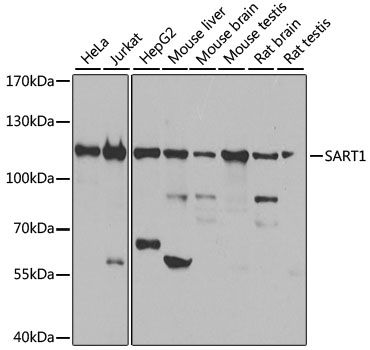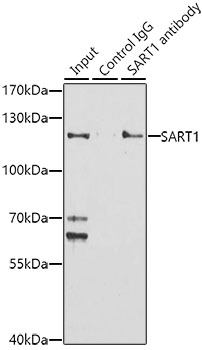Epigenetics & Nuclear Signaling Antibodies 4
Anti-SART1 Antibody (CAB8569)
- SKU:
- CAB8569
- Product Type:
- Antibody
- Applications:
- WB
- Applications:
- IP
- Reactivity:
- Human
- Reactivity:
- Mouse
- Reactivity:
- Rat
- Host Species:
- Rabbit
- Isotype:
- IgG
- Research Area:
- Epigenetics and Nuclear Signaling
Description
| Antibody Name: | Anti-SART1 Antibody |
| Antibody SKU: | CAB8569 |
| Antibody Size: | 20uL, 50uL, 100uL |
| Application: | WB IP |
| Reactivity: | Human, Mouse, Rat |
| Host Species: | Rabbit |
| Immunogen: | Recombinant fusion protein containing a sequence corresponding to amino acids 1-255 of human SART1 (NP_005137.1). |
| Application: | WB IP |
| Recommended Dilution: | WB 1:500 - 1:2000 IP 1:20 - 1:50 |
| Reactivity: | Human, Mouse, Rat |
| Positive Samples: | HeLa, Jurkat, HepG2, Mouse liver, Mouse brain, Mouse testis, Rat brain |
| Immunogen: | Recombinant fusion protein containing a sequence corresponding to amino acids 1-255 of human SART1 (NP_005137.1). |
| Purification Method: | Affinity purification |
| Storage Buffer: | Store at -20'C. Avoid freeze / thaw cycles. Buffer: PBS with 0.02% sodium azide, 50% glycerol, pH7.3. |
| Isotype: | IgG |
| Sequence: | MGSS KKHR GEKE AAGT TAAA GTGG ATEQ PPRH REHK KHKH RSGG SGGS GGER RKRS RERG GERG SGRR GAEA EARS STHG RERS QAEP SERR VKRE KRDD GYEA AASS KTSS GDAS SLSI EETN KLRA KLGL KPLE VNAI KKEA GTKE EPVT ADVI NPMA LRQR EELR EKLA AAKE KRLL NQKL GKIK TLGE DDPW LDDT AAWI ERSR QLQK EKDL AEKR AKLL EEMD QEFG VSTL VEEE FGQR RQDL YSAR DLQ |
| Gene ID: | 9092 |
| Uniprot: | O43290 |
| Cellular Location: | Nucleus |
| Calculated MW: | 90kDa |
| Observed MW: | 120kDa |
| Synonyms: | SART1, Ara1, HOMS1, SART1259, SNRNP110, Snu66, HAF |
| Background: | This gene encodes two proteins, the SART1(800) protein expressed in the nucleus of the majority of proliferating cells, and the SART1(259) protein expressed in the cytosol of epithelial cancers. The SART1(259) protein is translated by the mechanism of -1 frameshifting during posttranscriptional regulation; its full-length sequence is not published yet. The two encoded proteins are thought to be involved in the regulation of proliferation. Both proteins have tumor-rejection antigens. The SART1(259) protein possesses tumor epitopes capable of inducing HLA-A2402-restricted cytotoxic T lymphocytes in cancer patients. This SART1(259) antigen may be useful in specific immunotherapy for cancer patients and may serve as a paradigmatic tool for the diagnosis and treatment of patients with atopy. The SART1(259) protein is found to be essential for the recruitment of the tri-snRNP to the pre-spliceosome in the spliceosome assembly pathway. |
| UniProt Protein Function: | SART1: May play a role in mRNA splicing. May also bind to DNA. Belongs to the SNU66/SART1 family. 1 isoforms of the human protein are produced by alternative splicing. |
| UniProt Protein Details: | Protein type:RNA-binding; RNA processing; RNA splicing; Apoptosis; Spliceosome Chromosomal Location of Human Ortholog: 11q13.1 Cellular Component: nucleoplasm; Cajal body; Golgi apparatus; U4/U6 x U5 tri-snRNP complex; cytoplasm; cytosol Molecular Function:protein binding Biological Process: nuclear mRNA splicing, via spliceosome; spliceosomal snRNP biogenesis; positive regulation of cytotoxic T cell differentiation; maturation of 5S rRNA; nuclear mRNA cis splicing, via U2-type spliceosome; cell cycle arrest |
| NCBI Summary: | This gene encodes two proteins, the SART1(800) protein expressed in the nucleus of the majority of proliferating cells, and the SART1(259) protein expressed in the cytosol of epithelial cancers. The SART1(259) protein is translated by the mechanism of -1 frameshifting during posttranscriptional regulation; its full-length sequence is not published yet. The two encoded proteins are thought to be involved in the regulation of proliferation. Both proteins have tumor-rejection antigens. The SART1(259) protein possesses tumor epitopes capable of inducing HLA-A2402-restricted cytotoxic T lymphocytes in cancer patients. This SART1(259) antigen may be useful in specific immunotherapy for cancer patients and may serve as a paradigmatic tool for the diagnosis and treatment of patients with atopy. The SART1(259) protein is found to be essential for the recruitment of the tri-snRNP to the pre-spliceosome in the spliceosome assembly pathway. [provided by RefSeq, Jul 2008] |
| UniProt Code: | O43290 |
| NCBI GenInfo Identifier: | 10863889 |
| NCBI Gene ID: | 9092 |
| NCBI Accession: | NP_005137.1 |
| UniProt Secondary Accession: | O43290,Q53GB5, A6NDN1, |
| UniProt Related Accession: | O43290 |
| Molecular Weight: | 90,255 Da |
| NCBI Full Name: | U4/U6.U5 tri-snRNP-associated protein 1 |
| NCBI Synonym Full Names: | squamous cell carcinoma antigen recognized by T cells |
| NCBI Official Symbol: | SART1 |
| NCBI Official Synonym Symbols: | Ara1; HOMS1; Snu66; SART1259; SNRNP110 |
| NCBI Protein Information: | U4/U6.U5 tri-snRNP-associated protein 1; SART-1; hSnu66; hSART-1; SNU66 homolog; IgE autoantigen; SART1(259) protein; SART1(800) protein; U4/U6.U5 tri-snRNP-associated 110 kDa protein; small nuclear ribonucleoprotein 110kDa (U4/U6.U5); squamous cell carcinoma antigen recognised by T cells; squamous cell carcinoma antigen recognized by T cells 1; squamous cell carcinoma antigen recognized by T-cells 1 |
| UniProt Protein Name: | U4/U6.U5 tri-snRNP-associated protein 1 |
| UniProt Synonym Protein Names: | SNU66 homolog; hSnu66; Squamous cell carcinoma antigen recognized by T-cells 1; SART-1; hSART-1; U4/U6.U5 tri-snRNP-associated 110 kDa protein; Allergen: Hom s 1 |
| Protein Family: | U4/U6.U5 tri-snRNP-associated protein |
| UniProt Gene Name: | SART1 |
| UniProt Entry Name: | SNUT1_HUMAN |
View AllClose








